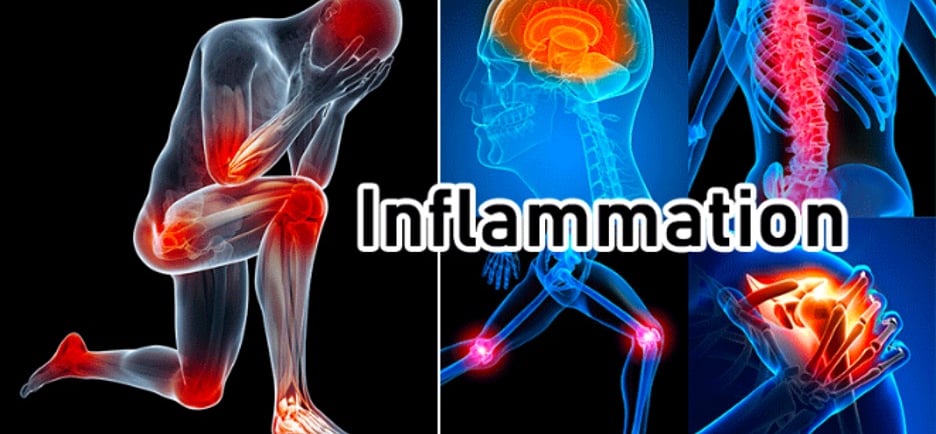Inflammation, The Body's Cure That Can Cause So Much Trouble
Inflammation is the body’s natural defense mechanism, but when it lingers or becomes excessive, it can lead to chronic pain and discomfort. This blog explores how inflammation works, why it’s a double-edged sword, and how simple lifestyle choices—like eating an anti-inflammatory diet, exercising regularly, and getting quality sleep—can help keep it in check. Learn how small changes can reduce swelling, improve overall well-being, and even enhance the benefits of therapeutic massage.
Lucas Benson, RN
2/25/20253 min read


Inflammation, in short, is the body's use of swelling to protect itself. By inflaming affected parts it is able to cordon off germs that would make someone sick and protect damaged areas due to injury. But like any medicine, the dose determines the precarious line between healing tonic and poison. In a very similar way, inflammation is at once a technique to battle affliction while often inflicting degrees of discomfort, pain and damage that fly in the face of healing and wellbeing.
The body is, if nothing else, a container of ultimate precision, especially with placement of its constituent elements. There is no extra space, and when tissues become inflamed and swell, they can produce a large variety of unwanted side effects. This is how common OTC pain relievers work, such as ibuprofen (Advil or Aleve, et al NSAIDs), by blocking or reducing the body's inflammatory response, thus reducing the pain and discomfort that accompanies swollen tissues within the body.
The inflammatory response is used widely within the body's systems. If you twist an ankle the injured tissues swell, same as if you get a common head cold. Hit your thumb with a hammer or get Covid, inflammation will be there. But aside from maladies that can happen to us, the modern lifestyle is ripe with ways that actively cause or increase the inflammatory response. While a healthy inflammatory response is essential for a healthy individual, it can be desirable to reduce some of the added inflammatory stressors we might be putting on our bodies.
Eat of the Fruits (and Veggies)
The tried and true wisdom of eating a well-balanced, nutritious diet based largely on fruits and veggies is as close to a magic bullet as there is against unnecessary inflammation in the body. Diet is a two-front approach to the reduction of swelling in that certain foods that can be added to the diet are able to proactively cause a reduction in inflammation, whereas the limiting or elimination of other foods can eradicate some underlying causes of an inflamed body altogether.
Fruits and vegetables are poised with the proper nutrients and antioxidants that can address specific markers of inflammation. By aiding in the process of reducing cellular damage and flushing byproducts they are able to nip inflammation in the bud. This decreases or outright eliminates the causes for it to occur in the first place, enabling a balanced inflammatory response.
Foods that can cause inflammation are usually processed foods loaded with refined carbohydrates, fats and sugars. Some foods to focus on that are known to cause inflammation are most fast and fried foods, chips, white bread, alcohol, artificial sweeteners, the list goes on and on. By focusing on reducing or outright dropping some of these inflammation inducing foods you can reduce swelling and feel better overall, day to day, with a decreased need for symptom relieving medications.
Run (Or Even Walk) For Your Life
The experts are talking and they're all saying the same thing, which is when it may become wise to listen. From Harvard Health to Johns Hopkins to the Mayo Clinic, the consensus is that after dietary methods, regular exercise is the key to keeping inflammation in a healthy relation to the body.
It doesn't take much, even 20 minutes a day of moderate exercise can have a large impact on the load of stressors impacting the inflammatory response. By forming a routine of daily movement, even as light as walking, we can help our bodies flow and adapt, keeping the gears ungummed and the guts unglued from inflamed tissues.
Less Swelling Through Sleep
It is cut from the “Too Good To Be True” cloth, but by getting adequate sleep each and every night, we provide our bodies with the time it needs to do some of its most important housekeeping. Studies show that 7-9 hours of sleep per night is optimal for most adults, and if observed on a regular basis the body can carry out the necessary functions to maintain conditions that keep the inflammatory response at bay and within a therapeutic threshold.
Free From The Build-Up
By observing some basic approaches to our lifestyles, namely eating a diet focused on whole foods with plenty of fruits and vegetables, exercising regularly and sleeping an adequate number of hours at night, we can have a major influence on our body's innate inflammatory response, giving us a huge upper hand in our daily struggle to feel our best and live without discomfort.
When the swelling of inflamed tissue is reduced we feel better, and have a drastic reduction in symptoms of pain and discomfort. Many ailments addressed in massage are aimed to assist in a reduction of inflamed symptoms, and by combining the key lifestyle points discussed here, we can increase the benefits and healing that is possible through massage and focused body work.
